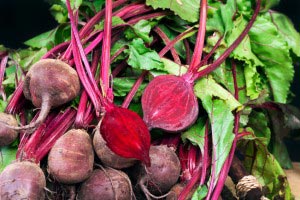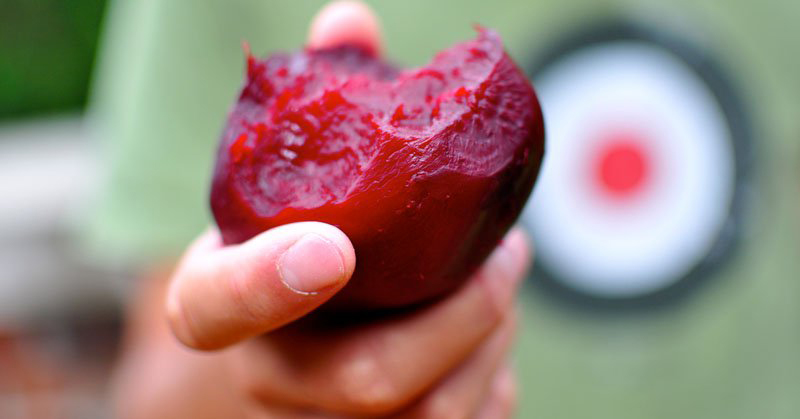Beets are one of those polarizing vegetables that you either love or you hate. For some they’re like “earth candy”, and add a beautiful pop of color to a dish; others claim that they would rather eat dirt (“after all, it would taste the same!”). Whether you enjoy eating them or not, chances are you’ve had the shocking experience that is the post-beet consumption red bowel movement. With its extreme resemblance to a bloody stool (apologies to anyone eating lunch while reading this), you were probably pretty freaked out the first time this happened to you, until you figured out it was just the beets you had at dinner the night before.
This horror-esque phenomena that are red beet stools can actually be used to our advantage. offering up some valuable knowledge of our colon health. Thanks to beets’ pungent pigment, we can track the transit time of our food and determine how healthy our lower GI tract is, if we are chronically constipated without knowing, or at risk of becoming so.
What is Chronic Constipation?
It is estimated that 15-20% of the American population suffers from chronic constipation, and that this unfortunate condition results in 2.5 million visits to the doctor annually. (1, 2, 3, 4)
A healthy colon should eliminate waste anywhere from 12-24 hours after eating. You should be having a bowel movement at least three times each week (though preferably more), ideally one large one in the morning and another smaller one later in the day. (1, 2, 3, 4)
Chronic constipation is typically defined as having less than three bowel movements a week and/or having difficult passing a stool. Those who suffer from chronic constipation will usually experience stools that are hard, lumpy, and difficult to pass, often struggling to completely empty their rectum. (1, 2, 3, 4)
Some people, however, may be “regular”, but this doesn’t necessarily mean they are eliminating waste effectively. Thankfully, there is a simple test to determine whether you have “slow transit time”, aka constipation, and all you need is a beet. (1, 2)
The Beet Test

The beet test is an easy an effective way to test how long it takes you to digest food, from consumption to elimination.
How it works:
Taking note of the time, eat a half or a whole raw or roasted beet, depending on size. Avoid using pickled beets from a jar or can, as they are often boiled for a long time and over-processed, which weakens the pigments needed for the test. (1, 2)
The Results:
If you notice your stool is red anywhere from 12 to 24 hours after eating the beet, congratulations! You have a healthy transit time. That being said, if you have difficulty passing the stool, that is still a red flag for colon troubles. (1, 2)
If it is over 24 hours before you pass a red stool, this means you have slow transit time and either have or are at risk for developing constipation. (1, 2)
If it has been less than 12 hours and you pass a red stool, this could mean you are not absorbing nutrients from your food, are experiencing minor diarrhea, are eating too fast or not chewing fully, or have had too many stimulants such as coffee. (1, 2)
Red Urine:
Many people experience red colored urine after eating beets, which can also look alarmingly similar to blood. This “beeturia” is a result of unmetabolized betalain pigments that pass throught the body. Normally they are oxidized and decolored by your stomach acid, however if you have low stomach acid than your urine will turn anywhere from pink to bright red. (5)
Low stomach acid has two primary effects on your health and well being, each with their own resulting problems:
- Decreased ability to digest protein:
This creates toxins in your intestines which increases your risk for chronic health problems. (5, 6, 7) - Decreased nutrient absorption:
Vitamins and minerals particularly effected are zinc, magnesium, iron, and the B-complex vitamins. This can result in anemia and extreme fatigue. (5, 6, 7)
Other implications of low stomach acid include: (5, 6, 7)
- Stomach bloating/ upset stomach (often described as a “hot” or “burning” in the stomach)
- Burping and flatulence
- Diarrhea
- Adult acne
- Chronic intestinal infections
- GERD and heart burn
Causes of Constipation
There are a whole variety of reasons that you may be chronically constipated, some more dangerous than others. These causes are: (3, 4)
- Blockages in the colon (this can be abdominal, rectal, or colon cancer, as well as anal fissures, bowel obstruction, or even bulges in the vagina)
- Problems with the nerves in the colon and rectal area (autonomic neuropathy, MS, Parkinson’s, spinal cord injury, and stroke)
- Issues with your pelvic muscles (inability to relax, coordinate relaxation and contraction, or weakened plevic muscles)
- Hormonal factors (diabetes, hyperparathyroidism, hypothyroidism, pregnancy)
- Age
- Being female
- Chronic dehydration
- Low fiber diet
- Sedentary lifestyle
- Medications (sedatives, narcotics, antidepressants, and blood pressure medications. Can also include over the counter pain medications and NSAIDs)
- Mental health conditions (eating disorders, depression)
7 Natural Constipation Remedies To Speed Up Transit Time
Thankfully, there are plenty of natural ways and simple fixes to speed up your transit time and avoid constipation.
1. Drink More Water
When you are dehydrated, more water is taken from your stools, leaving them dry, hard, slow-moving, and difficult to pass. By drinking plenty of water, you will help keep your bowels functioning properly. (1, 2, 3, 4)
2. Eat More Fiber
A diet high in fiber will add bulk to your stools and allow them to move more easily through your large intestine. To increase your fiber intake, include foods such as chia and flaxeed, more vegetables, pears, and berries. (1, 2, 3, 4)
3. Include Fermented Foods
Fermented foods are high in probiotics and healthy gut bacteria that will help keep the microbiota of your intestines in balance. This improves the health of your overall digestion and improves transit time through your colon. Include foods such as kefir, kimchi, saurkraut, and kombucha. (1, 2, 3, 4, 6)
4. Move More
If you aren’t moving, neither are your intestines! Not only do you need to get 20-30 minutes of physical activity in every day, but you also should avoid sitting for the rest of it. Get up from your desk often, go for walks or play catch instead of sitting and watching TV – the more you move, the better of your colon will be. (1, 2, 3, 4)
5. Go When You Need to
Don’t ignore the urge or try to “hold it in and wait”. When you are in the bathroom, relax, take your time, and don’t force it. (1, 2, 3, 4)
6. HCL Pepsin or Digestive Enzymes
Sometimes our GI tract just needs a little help, especially if you do have problems with low stomach acid. Things like drinking lemon water in the morning or taking apple cider vinegar before meals can help. You may also want to consider and HCL Pepsin supplement or digestive enzyme to take with meals. (1, 2, 6)
7. Consider Laxatives
While there are many natural laxatives that you can find in your kitchen, if you have taken all the previously mentioned steps and are still having difficulty going to the bathroom, make an appointment with your health care practitioner or doctor to talk about finding a laxative or stool softener that will be right for you. (1, 2, 3, 4)
Provided there aren’t outstanding problems causing your constipation (blockages, cancer or illness, medications), your colon should respond relatively quickly and your constipation should dissipate. Perform the beet test every month or so to monitor how your colon is doing and as a way to keep an eye on your digestive health.
Sources
- https://globalnews.ca/news/1171722/the-bowel-movement-beet-test-how-to-measure-your-digestive-transit-time/
- https://www.mayoclinic.org/diseases-conditions/constipation/home/ovc-20252671
- https://www.webmd.com/digestive-disorders/features/chronic-constipation-facts-vs-myths#1
- https://www.ncbi.nlm.nih.gov/pubmed/8148871
- https://www.ramauniversityjournal.com/medical/pdf_june/16-26.pdf

